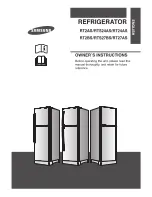
Built-In Refrigeration
15
subzero.com/specs
Flush Inset Panels
The flush inset application allows decorative panels on the
front of the unit to be flush with surrounding cabinetry and
is available for all built-in overlay models. For exact panel
dimensions, refer to flush inset panel specifications on the
following pages.
The flush inset design allows decorative panels to cover
the door trim for a seamless appearance that blends with
the design of the room. The most common way to achieve
this look is to work with three panels—the decorative flush
inset panel, which is typically 19 mm, a 3 mm spacer
panel and a 6 mm backer panel. Depending on your
cabinet manufacturer, this could also be one panel routed
for different dimensions.
Regardless of the physical construction of the panels
(three-panel assembly or routed panel), you will need to
follow the flush inset panel specifications on the following
pages for exact sizing and panel placement to ensure a
proper fit.
Flush Inset Panel Requirements
MAX WEIGHT PER PANEL
All Flush Inset Models
23 kg
Grille Panel
6 kg
MIN PANEL THICKNESS
All Flush Inset Panels
16 mm
6
mm
3
mm
FLUSH INSET
PANEL
SPACER
PANEL
BACKER
PANEL
19
mm
typical
Three-panel assembly.
The illustration below provides a rear view of the three-
panel assembly with critical dimensions, standard for all
built-in models.
IMPORTANT NOTE:
The inside edges of the rough opening
as well as the sides and a portion of the back side of the
decorative panels will need to be finished, as they will be
exposed when the doors are open.
IMPORTANT NOTE:
For flush inset panels thicker than
19 mm, a 90° door stop may be required to prevent inter-
ference with adjacent cabinets. Refer to the full-scale tem-
plates at the end of this section.
IMPORTANT NOTE:
When installing two units side by side
in a flush inset application, refer to pages 23–27 for dual
flush inset installations. Be aware that rough opening
dimensions, panel sizes and offsets are different for this
application.
Do not exceed flush inset panel dimensions, as this
could cause damage to panels and the Sub-Zero unit.
















































